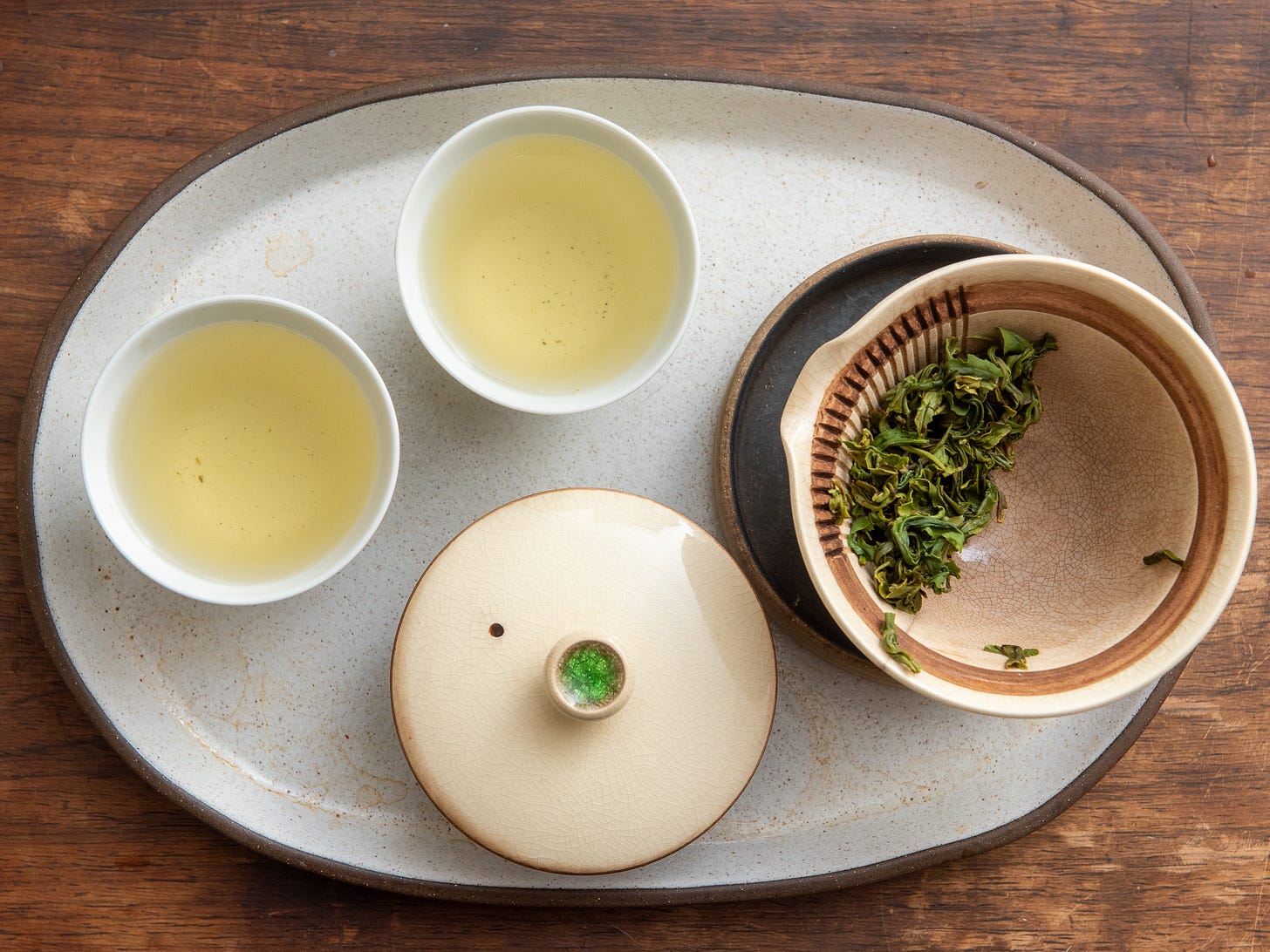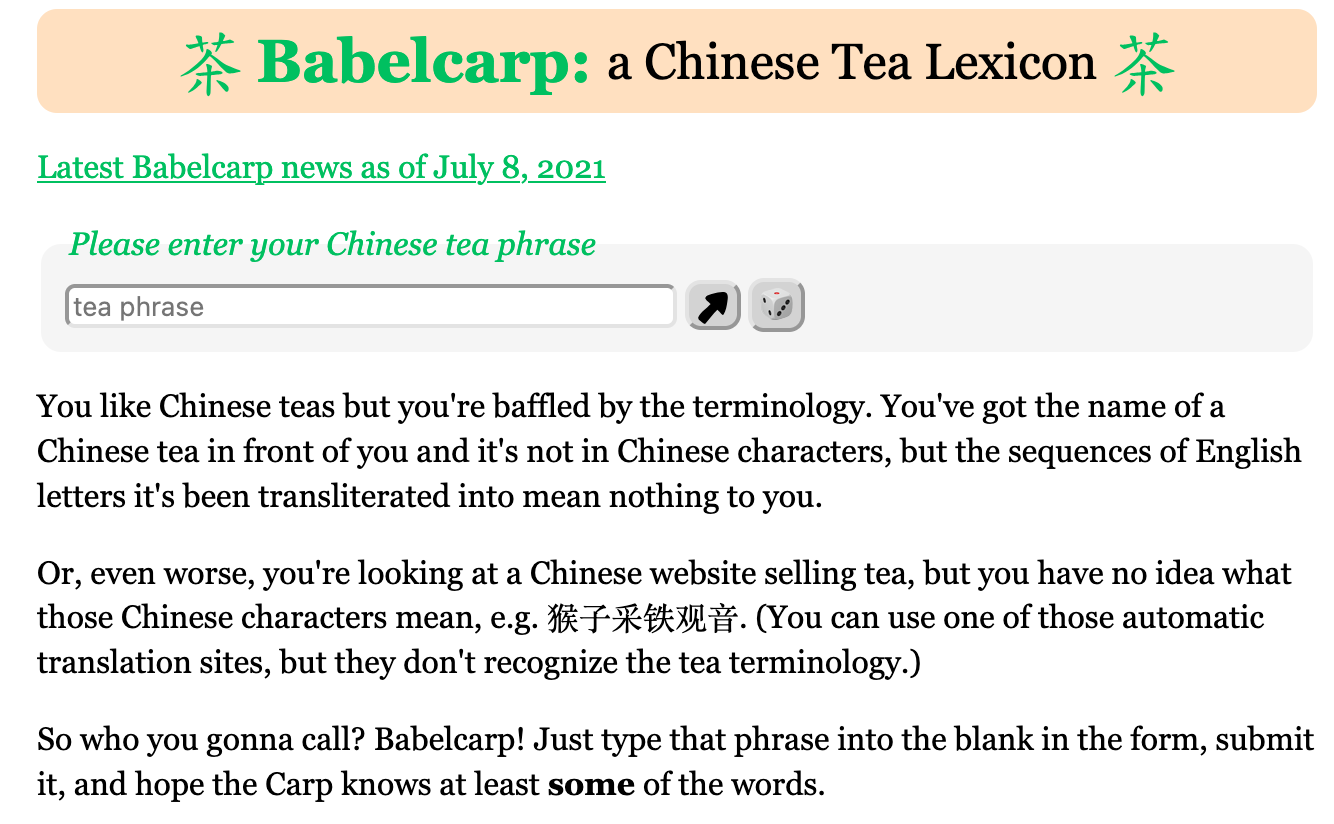The tea translation tool you need in your life
New harvest green tea + an introduction to Babelcarp creator Lew Perin.
Sipping on snails
The tea: Pre-Qingming bi luo chun green tea, sold by Upton Tea Imports. $28.50 for 50g.
It’s a general truth of food crops that the slower a plant grows, the better it tastes. Plants are mostly water, and when one bolts out quickly, the volatile flavor compounds in the leaves, stems, and fruit are literally watered down. So once the spring season begins, growers in the cutthroat business of Chinese tea want to harvest their first flush as soon as possible. Early spring leaves are limited by dry days and cold nighttime temperatures; both factors result in small yields of slow growth from plants that had to struggle a bit to produce new buds. Later growth accelerates as temperatures warm and the rainy season begins, but the more abundant harvest is sold for a lower price.
Qingming is the tomb-sweeping festival that marks the arrival of spring rains—at least historically, as climate change makes rainfall more volatile. Mingqian tea, or tea harvested before Qingming, is considered the highest quality. Today’s green tea is a mingqian bi luo chun (“green snail spring”) that shows the value of slow growing leaf. I’ve covered a Taiwanese take on bi luo chun before. This small leaf version is the original Chinese style with curly tips covered in downy trichomes.
The source: Upton Tea Imports started selling specialty looseleaf in 1989, back when there weren’t many American sources for the stuff. Orthodox teas like Kenyan purple tip are the core of their collection but they also offer a range of traditional East Asian teas. Bi luo chun originated in the Dongting mountains of Jiangsu and is one of the most renowned green teas in China. Top grades are made from tiny leaves and buds, concentrating the spring season even further as it takes thousands of buds to produced a finished pound of tea.
To brew: Cold brew this tea to heighten its lubricating texture and slight fruity flavor. Mix 8 to 10 grams (about a tablespoon) in a liter of water and chill for at least five hours, though you could go as long as 48. Nuttier flavors dominate when 5 grams are brewed with 190°F water in a 150 milliliter pot (1g/30ml) for 30 seconds. The brew tastes soft, soothing, and faintly floral this way. This isn’t top grade bi luo chun—notice the larger and broken leaves—but top grade green tea can get wildly expensive. I usually slum it in the middle grades that still offer a distilled taste of the season with better value for the price.
Babelcarp and the promise of a free tea internet
On an internet choked with AI chum, affiliate links, and software that tracks every click, Babelcarp is a beacon. This lexicon does something very specific for a group of people with specific needs: enter a Chinese tea term and find a concise English definition tailored to tea nerds. Does that unfamiliar word refer to a province, a type of tea, or some obscure pottery glaze? Babelcarp usually has the answer, making it an indispensible tool for learning the hows and whys of a drink that easily gets lost in translation.
Tea is full of poetic names that, in my experience at least, go in one ear and out the other. Take “shou mei.” The term means “longevity eyebrow,” a cheeky comparison of the leaves’ bushy appearance to the folicular forests on an elder’s face. If you ask Google Translate what shou mei means, it’ll suggest hands or eyebrows. Babelcarp defines shou mei thusly:
Shou4 Mei2 (Shou4 Mei2) = Fujian, Jiangsu, or Guangxi fourth grade of baicha made, after Gongmei, from third leaves, literally Longevity Eyebrow (寿眉 or 壽眉)
The numbers refer to Chinese tones. The hyperlinks bring you to equally to-the-point definitions that can send you down a rabbit hole of discovery. And you’ll never get a pop-up about the site using cookies to optimize your browsing experience. Babelcarp is the creation of Lew Perin, a programmer who first got into tech when “paper tape and punch cards were avant garde.” He’s a tea person worth getting to know.
Keep reading with a 7-day free trial
Subscribe to Leafhopper to keep reading this post and get 7 days of free access to the full post archives.








